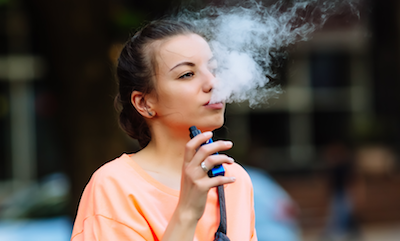Teens Who Vape Are More Likely to Start Smoking.
 The sudden rise of e-cigarette use, or vaping, among youth has led to widespread concern among parents, school administrators, and the FDA. But, while research has shown an association between youth vaping and smoking traditional cigarettes, it has been less clear whether vaping leads to smoking.
The sudden rise of e-cigarette use, or vaping, among youth has led to widespread concern among parents, school administrators, and the FDA. But, while research has shown an association between youth vaping and smoking traditional cigarettes, it has been less clear whether vaping leads to smoking.
Now, a new study led by School of Public Health researchers finds that youths who start out vaping are more likely to go on to smoke traditional cigarettes than their peers who have no prior tobacco or nicotine use.
The study, published in JAMA Network Open, found that one in five youths whose first nicotine product is an e-cigarette go on to smoke traditional cigarettes.
“Our results support the view that vaping increases risk of subsequent cigarette use in youth,” says senior author Andrew Stokes, assistant professor of global health. “The association was especially pronounced in low-risk youth, raising concerns that vaping may renormalize smoking behaviors and erode decades of progress in reducing smoking rates.”
Instead, for the new study, the researchers looked at what tobacco or nicotine product youths used first. To do this, they used data from the Population Assessment of Tobacco and Health Study (PATH) to follow 6,123 US youths 12-15 years old who had not used any tobacco or nicotine products in 2013-2014.
By 2015–2016, 8.6 percent of the study participants reported that they had used an e-cigarette as their first tobacco or nicotine product, 5.0 percent had first used another non-cigarette product like hookah or chewing tobacco, and 3.3 percent had first used traditional cigarettes.
Of those who had vaped first, 20.5 percent reported that they had ever smoked cigarettes, while 21.1 percent of those who had first used another non-cigarette tobacco product first had ever smoked cigarettes. The researchers found that the study participants were three times more likely to go from vaping to smoking cigarettes than to go straight to smoking cigarettes. They also found that this pattern was more pronounced among youth who appeared lower-risk for smoking and other substance use based on the data collected by PATH.
Based on their findings, the researchers estimated that, nationally, 178,850 US youths aged 12-15 years vaped and then went on to ever smoke a cigarette during the study period, and 43,446 went from vaping to reporting that they currently smoked cigarettes in 2016.
The study was co-authored by Emelia Benjamin, professor of epidemiology at SPH and professor of cardiovascular medicine at the School of Medicine. The other co-authors were: Jessica Fettermanof the School of Medicine; Aruni Bhatnagar of the University of Louisville; andJessica Barrington-Trimisand Adam Leventhal of the University of Southern California, Los Angeles.
—Michelle Samuels